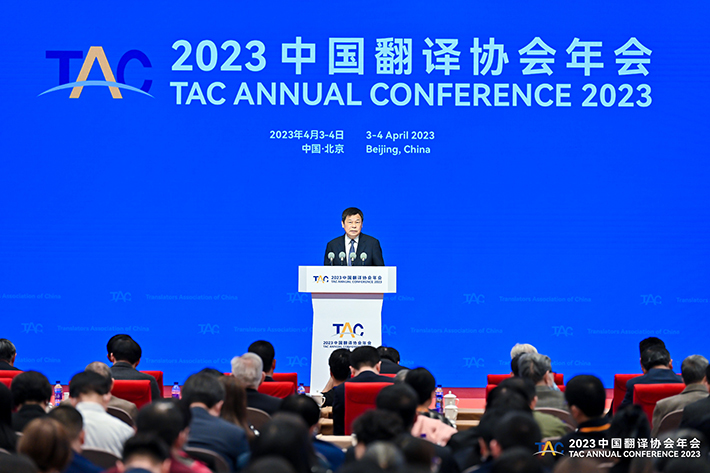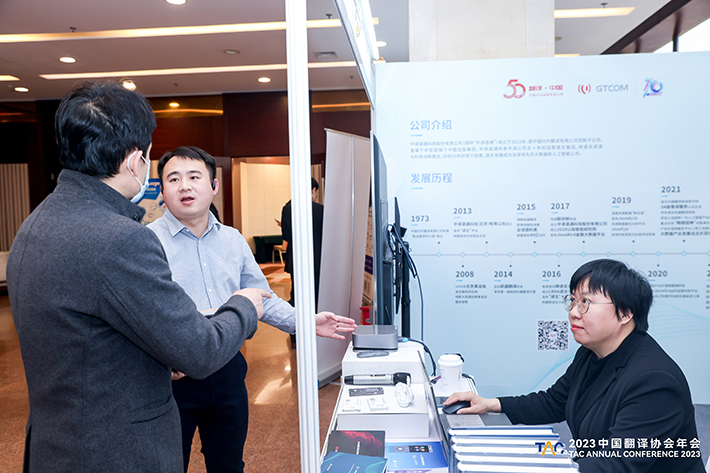|
||||||||||
| Home Nation World Business Opinion Lifestyle ChinAfrica Multimedia Columnists Documents Special Reports |
|
||||||||||
| Home Nation World Business Opinion Lifestyle ChinAfrica Multimedia Columnists Documents Special Reports |
| ChinAfrica |
| Giving a stronger voice |
| Advanced technologies like ChatGPT unlikely to replace human translators and interpreters, say experts |
| By Li Qing 丨VOL. 15 May 2023 ·2023-04-19 |

Du Zhanyuan, President of China International Communications Group and the TAC, speaks at the opening ceremony of the TAC Annual Conference in Beijing on April 3
Several months have passed since ChatGPT stepped into the spotlight. The advanced artificial intelligence (AI) chatbot trained by US company OpenAI has become a global hit thanks to its surprising capabilities, including writing essays, poems and computer code, as well as pooling data. It has generated a lot of discussion about its business value, the progress of AI and the revolution of the Internet.
During this year’s Translators Association of China (TAC) Annual Conference, one main concern stood out: Will advanced technologies such as ChatGPT replace translators and interpreters and put them out of work? Fortunately, the answer most experts gave was “no.”
But that does not mean industry stakeholders can breathe a sigh of relief, as there are still many tough tasks in store for them. For instance, how to standardise translation in specific fields like traditional Chinese medicine, how to upgrade and train better translators and interpreters to serve the changing market, and how to promote effective and exact international communication through translation - a major topic of the conference.
“We need to upgrade the national translation capabilities to serve China’s international communication and to introduce its development amid profound changes in the world,” Du Zhanyuan, president of China International Communications Group (CICG) and TAC, said at the conference.
“There is an urgent need to enhance our voice in international discourse, deepen exchanges between civilisations and introduce Chinese culture to the world,” he continued, emphasising the need to create a credible, positive, and respectful image of China through accurate and vivid translation.
An industry event
The TAC Annual Conference is the most anticipated event in China’s translation and interpretation industry as it gathers language professionals from all over the country and beyond to exchange their ideas and practices in the field.
Themed Developing a Strong National Translation Capacity and Promoting Mutual Learning Between Chinese and Foreign Civilisations, the conference kicked off on April 3. The two-day event featured the release of up-to-date reports on the domestic and global language services industry, awards in recognition of accomplished translators, and parallel forums discussing issues in translation and interpretation undertakings such as development trends and translator training.
According to the conference, the number of people working in the translation and language services sector in China reached 6.01 million in 2022, up 11.7 percent from the previous year.
“The translating and interpreting community has substantially supported and boosted the country’s international exchanges on all fronts,” Tang Heng, deputy secretary general of the Publicity Department of the Communist Party of China Central Committee, said at the event.

A participant of the annual conference of the Translators Association of China (TAC) learns about the business of a translation and language service company at its booth in Beijing on April 3
Strategies
According to a report on domestic translation and language services released during the conference, many industries showed strong demand for standardisation last year. Incorrect methods of translation can confuse and cause trouble for people active in the field.
Gong Jieshi, a Chinese-to-French translator, said the lack of standardisation for translating Chinese political texts often results in the readers’ misinterpretation of China’s policies. “I hope the translation sector can zoom in on this problem and formulate proper standards,” he said.
The up-to-standard translation should be based on correct decoding of essential concepts and expressions with Chinese characteristics, and explanations friendlier to foreign readers, Zhu Yuan, a commentator for state-owned English-language newspaper China Daily, said.
“Establishing a standard for translating a particular subject requires the publication of a large number of translated works, from which translators and academics in the field can analyse, compare and make a final decision,” Fang Tingyu, director of the English Communication and Research Centre for Chinese Medicine at the Beijing University of Chinese Medicine, said.
This may take decades of work and we need more people with inter-disciplinary qualifications and experience, he added.
David Ferguson, honorary chief English editor with the Foreign Languages Press affiliated with CICG, suggested adjusting methods to target different audiences. China needs to explore more ways to communicate, the winner of the 2021 Chinese Government Friendship Award said. For example, Chinese politicians and diplomats can talk with American people directly and help them to realise that the Chinese and the American peoples are the same and are both just trying to make a living, he explained.
Working together
Over the past five years, the output growth rate of China’s translation and language services has exceeded the global average, thanks to the active participation of Chinese companies, according to a report released at the conference. Despite the impact of the COVID-19 pandemic, the business of translation companies still shows a trend of rapid growth, with its total output value now exceeding 60 billion yuan ($8.73 billion) for the first time.
The report says that with the rapid growth of online translation tools and AI, last year saw higher translation efficiency.
Private companies providing translation and other language services can contribute to China’s international communication by embracing machine translation and jointly building a corpus to provide global users with exact information about China, Yu Yang, manager of China Translation Corp., said at the conference.
English has, so far, been the most-used language for training AI, said He Enpei, founder and president of AI language service provider Transn. He said AI translation into Chinese has yet to reach the standard of AI translation into English. “The translated texts in Chinese can meet the need of understanding but are not accurate, vivid or authentic,” he added.
“We need to break the barriers between people studying languages, translation, technology and international communication by deepening the integration of related disciplines and departments,” he said. “Only if the government, market and society work together, can we boost the influence of our language and technology in the global arena.”
|
||
| About Us | Contact Us | Advertise with Us | Subscribe |
| Copyright Beijing Review All rights reserved 京ICP备08005356号-5 京公网安备110102005860号 |